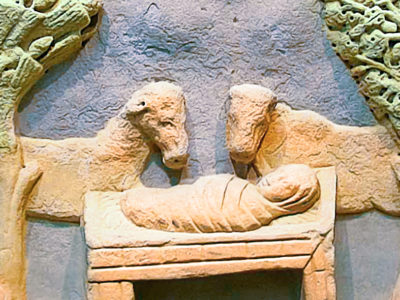KING JAMES VERSION of the Bible captures the story of Jesus’ birth in wonderful Shakespearean poetry. There’s good reason this Bible sounds so much like William Shakespeare was on the translation committee. He was alive at the time.
Forsooth, people talked like Shakespeare wrote, though he certainly added his own style
Modern Bible translations and paraphrases might never equal the poetry of the King James, but they can hope to tell the story in a way that people of their day can understand.
This is my attempt to retell in today’s English the ancient story preserved in the Gospel of Luke, chapter two.
Joseph goes home to Bethlehem
Luke 2:1. About the time Mary got pregnant, Caesar Augustus ordered a census. He wanted to count everyone in the Roman world.
2:2. This was the first census the Romans took after Quirinius became Syria’s governor.[1]
2:3. Folks went to their hometown to register.
2:4. Joseph did, too. He left Nazareth, a city in the region called Galilee. He went south to Bethlehem.[2] That’s where he came from—the hometown of his famous relative, King David.
2:5. Joseph went there to register. He took his fiancée, Mary, who was pregnant.
2:6. They got to Bethlehem just in time for her to give birth.[3]
2:7. Mary had her first child. A boy. She wrapped him tightly, swaddling him in cloth. Then she laid him in a feeding trough—a manger for his bed. She had no choice. There were no guest vacancies in the town.[4]
Shepherds get a birth announcement
2:8. Near the village, shepherds had set up camp and were keeping an eye on their sheep at night.
2:9. All of a sudden an angel showed up, right there in front of them. Heaven’s glory lit the camp like a spotlight, terrifying the shepherds.
2:10. “Don’t be afraid,” the angel told them. “I’ve got great news—joy to the world for people everywhere.
2:11. Born today, in David’s hometown, is your Savior. He’s the Messiah,[5] your Lord.
2:12. Here’s how you can know it’s him. You’ll find a baby wrapped in cloth, lying in a manger.”[6]
2:13. Suddenly, all heaven broke loose. The lone angel wasn’t alone anymore. He brought company. Angels everywhere—a skyful—happy and saying wonderful things about God:
2:14. “Praise God from here to high heaven. Peace has come to earth for everyone who loves God and wants nothing more than to please him.”[7]
2:15. When the angels left, the shepherds couldn’t stop talking. “What are we doing still standing here? We need to get our feet moving right now to Bethlehem so we can see for ourselves what the Lord told us.”
2:16. They did not walk, they ran until they found Mary and Joseph. There he was, the baby, lying in a manger.
2:17. When they saw this with their own eyes, they were all mouth. They couldn’t not stop talking about what God’s angels had told them about this child.
2:18. The people who heard what the shepherds said were amazed beyond amazing.
2:19. Mary scooped up every word like a treasure and stored them in her memory. Quietly, she pondered all of this in her heart.
2:20. The shepherds went back to their flock. They didn’t go quietly. Still talking. Still laughing. Still thanking God for everything he let them hear and see on that remarkable day.
Notes
[1] 2:2. Roman records report that in AD 6, perhaps a decade after Jesus was born, Rome appointed Quirinius as governor of Syria and ordered him to take a census of his district, which included what are now Israel and Palestinian Territories. Rome wanted this body count of Jews so they could estimate future tax money the empire could expect from them. There’s nothing on record yet about Quirinius conducting a census earlier, when Jesus was born. One theory is that Quirinius served two terms since this was “the first census,” implying another one came later.
[2] 2:4. This was about a four-day walk along the shortest caravan routes through the hilly, central part of the country, roughly 75 miles (120 km).
[3] 2:6. Just in time to add one more name to the census register: Jesus.
[4] 2:7. The Greek word for the place of lodging, which is sometimes translated “inn,” is katalyma. Many Bible experts today say this doesn’t necessarily refer to a hotel-like business. A Greek word for that, used in the story of the Good Samaritan is pandocheton (Luke 10:34).
[5] 2:11. “Messiah” in the original Greek language of the New Testament is Christos, from which we get the word Christ. It means “Anointed One,” as in “anointed by God.”
[6] 2:12. A feeding trough for livestock.
[7] 2:14. Literally, “to those favored,” a religion tech phrase at the time referring to people God has blessed—those who embrace God’s Son. The phrase is possibly a reference to a line in Mary’s song, Luke 1:50.


Leave a Reply